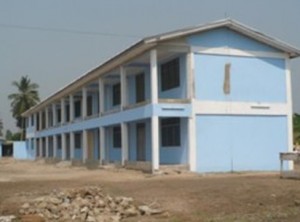Kpankole farming community appeals for school facility
 Residents of Kpankole in Wa Municipality have appealed for establishment of a school in the community to enroll several children of school going age loitering around.
Residents of Kpankole in Wa Municipality have appealed for establishment of a school in the community to enroll several children of school going age loitering around.
More than 60 children who have turned age five and above in the farming community have to trek over two miles each day to neighbouring community, Jonga-Tabiesi to school.
But the children are usually trapped during raining season because of over flooding of two streams of its banks crossing the road without coverts, according to community members.
Mr Jor Moses, a resident, who spoke with the Ghana News Agency, estimated that more than 55 children in the community fail to attend school because of distance, lack of mobility and unavailability of a school building and other facilities.
He said community leaders and members have raised concerns about the bleak future of their children through the Assembly Member for the area, but were yet to receive any positive response.
Nearly 623,500 children of primary school age in Ghana are still not enrolled in primary school and one out of four children in the kindergarten age ranged (from four to five years of age) are not in pre-school.
While, about 20 per cent of children with physical disabilities are not attending school, according to Ghana’s 2010 national population and housing census.
The people of Kpankole has vowed to turn down favours from politicians used to influence their votes in the run up to 2020 national elections, if the community is not provided with a school.
They are also worried the community not been connected to the national grid though electricity poles have been erected in the area since 2016.
Many of them, who had lined up to talk with the GNA said the deplorable state of the road from Jonga–Tabiesi to Kpankole ought to be fixed immediately.
They alleged pregnant women suffer excruciating pains during labour due to the bad nature of the road network leading to healthcare centres particularly to the Upper West Regional Hospital in Wa or Charingu Health Centre.
Residents therefore appealed to the authorities of Wa Municipal Assembly to connect the community with over 17 households to the national grid and also fix their bad road network.
The community last year attained open defecation free status to add up to other four communities that were declared open defecation free out of 86 communities in Wa Municipality.
The Assembly Member for Yebile Electoral Area, Mr Fuseini Issahaku, confirmed to the GNA the myriad of concerns raised by the community and said it was reported to the Municipal Assembly for remedial action.
He said the Assembly followed up to assess the situation on the ground and to identify the possible means of providing a school for Kpankole and Mojong communities.
“Currently, two volunteers from the community are to teach the children until the community gets a school,” he said.
According to him, a contractor for the rural electrification project promised to continue the work for the community to be connected to the national grid.
Source: GNA
